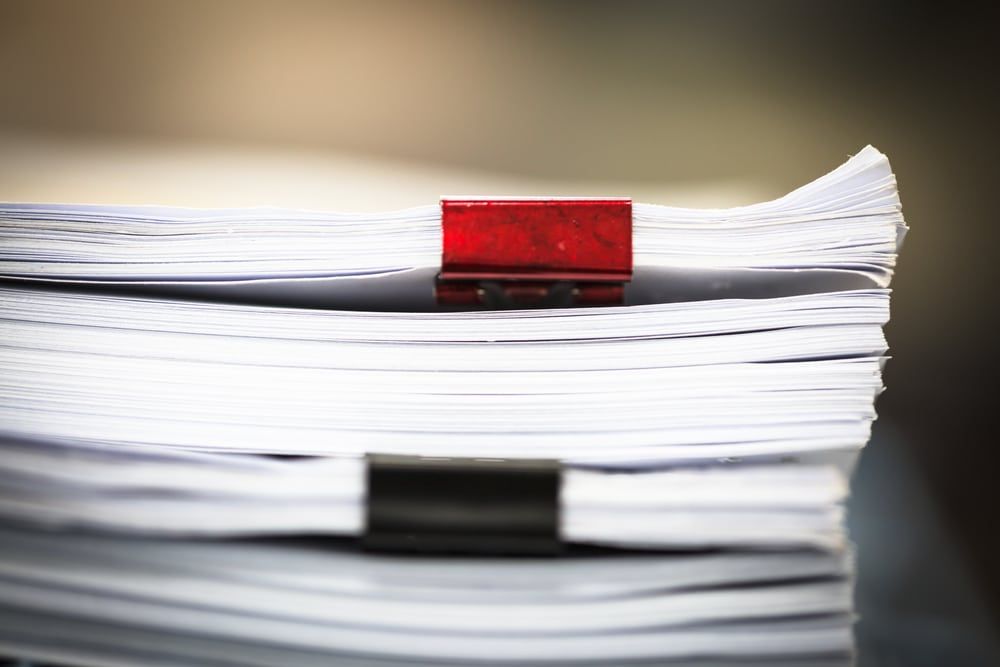Recycling paper in the workplace: starting the movement
Each year, an employee can throw away up to 85 kg of paper in the course of his work. This volume includes documents, cardboard, packaging, etc. However, professionals recycle barely 20% of this type of waste. This waste is really alarming in a context of climate crisis.
It is therefore urgent to promote good habits such as selective sorting and recycling in companies.
Why recycle paper in your company ?
The paper recycling in companies is above all a question of common sense. Indeed, this type of waste constitutes 75% of the content of office waste garbage cans in France, according to Ademe. Every employee also throws in the equivalent of 30 reams of paper per year on average (about 75 kg).
Thus, the office papers of the private and public sector represent 900 000 tons of waste each year.
To measure the extent of the waste, this amount of waste is equivalent to 90 times the weight of the Eiffel Tower. However, the company will somehow finance the collection and processing of this waste. Transport is also a significant expense from your containers to the landfill.
With the recycling, you avoid unnecessary expenses and support new waste management activities.
On the other hand, paper has become a decisive waste item to limit its environmental impact. Paper recycling will reduce national CO2 emissions by 390,000 tons per year, according to Ademe. This volume is equivalent to theannual carbon footprint of 200,000 cars. In addition, recycled paper helps save energy and natural resources (water and wood).
You will also improve your image through these solidarity and eco-responsible actions.
How to recycle paper in your company ?
You don’t necessarily need to review your entire organization to define a process for paper recycling in companies. You only need to be clear, coherent and methodical to encourage staff commitment. To start, you need make an inventory of the premises.
In particular, you should assess your daily waste volume to determine the size of the bins and the frequency of collection.
The second step is to find the service provider who will take care of the removal and treatment of the waste. To choose your interlocutor, do not hesitate to make a comparison between the companies and the offers present on the market. The price is obviously important in this approach.
However, it is also important to collaborate with actors sharing the values of your company.
Reducing your paper consumption is possible. Reduce your digital footprint’is also. Some municipalities offer paper collection and recycling services. Think of checking the existence of these devices in your city.
After this step, work on the visibility of equipment and sorting instructions. Display them prominently in the company’s premises, preferably near printers and photocopiers. Finally, take care of your communication and awareness method.
A legal obligation ?
The recycling of company paper is mandatory for any structure established in France and counting more than 20 people. This measure is included in the “5-stream decree” adopted on March 10, 2016. The name of the text refers to the legal obligation to separate waste into five distinct categories, namely
- Paper and cardboard (envelopes, sheets, paper packaging…);
- Metal (empty cans, tins, pencil jars…) ;
- Plastic (cups, spoons, bottles and flasks…) ;
- Glass (jars, frames, vases…);
- Wood.
Logically, you should to provide 5 containers to sort these different materials. The service provider is also required to certify the collection and processing of these waste streams. It must in particular specify the nature and volume of waste This volume is equivalent to the amount of waste collected and its destination (reuse, composting, incineration…).
Mandatory paper recycling stems from the 2015 law on energy transition. In addition to companies, it concerns businesses, administrations and communities. The rule also applies to entities whose waste production exceeds 1,100 liters per week.

How to recycle confidential documents within the company ?
In the era of RGPD, the confidential data are particularly tricky for companies. These include contracts, flyers, and personal information about customers or employees, among others. Standard recycling is therefore distrusted because of the many stations and manipulations associated.
The leaks are indeed important possibilities in the traditional circuit.
To avoid any risk, companies often shred this type of paper before depositing it in the yellow bins. However, they become difficult, if not impossible, to recycle after being shredded. The problem comes from size and lightness of these shreds.
Thus, the sorting centers do not succeed in treating them correctly and in ensuring the recovery of waste.
Nevertheless, a approved provider generally offers special bins for confidential documents. These containers were designed for files and papers including sensitive information, personal data, etc. Therefore, they are sealed and secured all along the waste treatment circuit.
The operator will then provide a certificate attesting to their recycling or destruction.